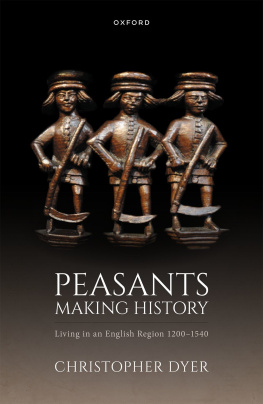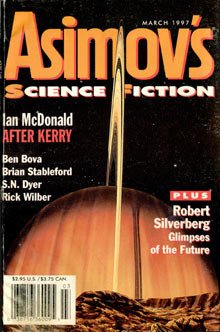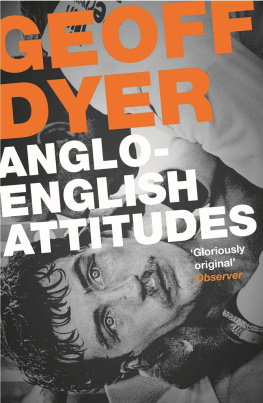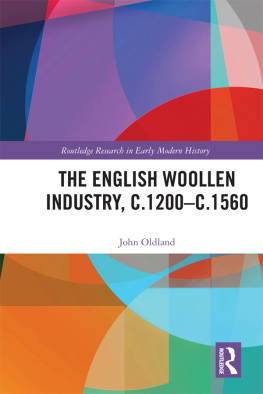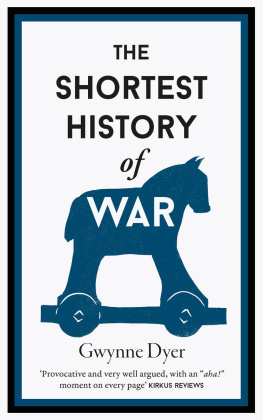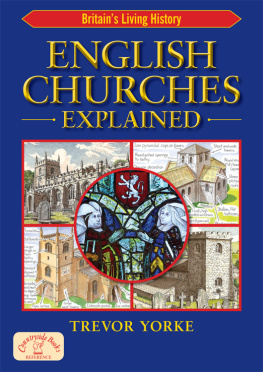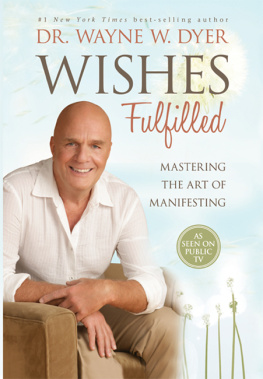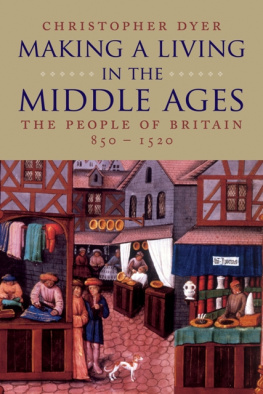Christopher Dyer - Peasants Making History: Living in an English Region 1200-1540
Here you can read online Christopher Dyer - Peasants Making History: Living in an English Region 1200-1540 full text of the book (entire story) in english for free. Download pdf and epub, get meaning, cover and reviews about this ebook. year: 2022, publisher: OxfordUP, genre: Religion. Description of the work, (preface) as well as reviews are available. Best literature library LitArk.com created for fans of good reading and offers a wide selection of genres:
Romance novel
Science fiction
Adventure
Detective
Science
History
Home and family
Prose
Art
Politics
Computer
Non-fiction
Religion
Business
Children
Humor
Choose a favorite category and find really read worthwhile books. Enjoy immersion in the world of imagination, feel the emotions of the characters or learn something new for yourself, make an fascinating discovery.
- Book:Peasants Making History: Living in an English Region 1200-1540
- Author:
- Publisher:OxfordUP
- Genre:
- Year:2022
- Rating:5 / 5
- Favourites:Add to favourites
- Your mark:
- 100
- 1
- 2
- 3
- 4
- 5
Peasants Making History: Living in an English Region 1200-1540: summary, description and annotation
We offer to read an annotation, description, summary or preface (depends on what the author of the book "Peasants Making History: Living in an English Region 1200-1540" wrote himself). If you haven't found the necessary information about the book — write in the comments, we will try to find it.
Peasants Making History: Living in an English Region 1200-1540 — read online for free the complete book (whole text) full work
Below is the text of the book, divided by pages. System saving the place of the last page read, allows you to conveniently read the book "Peasants Making History: Living in an English Region 1200-1540" online for free, without having to search again every time where you left off. Put a bookmark, and you can go to the page where you finished reading at any time.
Font size:
Interval:
Bookmark:


Great Clarendon Street, Oxford, OX2 6DP, United Kingdom
Oxford University Press is a department of the University of Oxford. It furthers the Universitys objective of excellence in research, scholarship, and education by publishing worldwide. Oxford is a registered trade mark of Oxford University Press in the UK and in certain other countries
Christopher Dyer 2022
The moral rights of the author have been asserted
First Edition published in 2022
Impression: 1
All rights reserved. No part of this publication may be reproduced, stored in a retrieval system, or transmitted, in any form or by any means, without the prior permission in writing of Oxford University Press, or as expressly permitted by law, by licence or under terms agreed with the appropriate reprographics rights organization. Enquiries concerning reproduction outside the scope of the above should be sent to the Rights Department, Oxford University Press, at the address above
You must not circulate this work in any other form and you must impose this same condition on any acquirer
Published in the United States of America by Oxford University Press
198 Madison Avenue, New York, NY 10016, United States of America
British Library Cataloguing in Publication Data
Data available
Library of Congress Control Number: 2021952504
ISBN 9780198847212
ebook ISBN 9780192586537
DOI: 10.1093/oso/9780198847212.001.0001
Printed and bound by CPI Group (UK) Ltd, Croydon, CR0 4YY
Links to third party websites are provided by Oxford in good faith and for information only. Oxford disclaims any responsibility for the materials contained in any third party website referenced in this work.
This book is the result of research over many years, and in acknowledging help that has been received I will focus on those who have participated or have given advice in the period of active preparation since 2011. Initial progress was made possible by a Leverhulme Trust Emeritus Fellowship for which I was grateful because it enabled me to visit archives intensively, and to gain from the reliable and skilful services of Matthew Tompkins. The Aurelius Charitable Trust funded the preparation of the figures, which were drawn expertly by Andy Isham. During the period of preparation, I became involved in a number of short-term projects which were relevant to the themes of the book. They encouraged me to embark on specialized aspects of my theme, and stimulated me with contacts with other scholars. These included work on the Inquisitions Post Mortem on a project led by Michael Hicks, and investigations of social mobility with Sandro Carocci. Conference papers at the University of Western Australia and the Leeds Medieval Congress made me pull together my thinking about poverty. I learnt more about open fields from a symposium hosted by Erik Thoen, and I found the discussions on serfdom at the Anglo-American conference organized by Phillipp Schofield in 2019 very helpful. The theme of migration figures prominently in this book mainly because of my involvement in a project devised by Jo Story and the late Mark Ormrod. Umberto Albarella, by inviting me to a conference on the archaeology of birds, encouraged me to study poultry more closely. Invitations to contribute to conferences and books by Phillipp Schofield and Martin Allen encouraged me to work on tithes and earnings. Early versions of were delivered in a lecture to the Institute of Historical Research, a lecture at Taunton in memory of Mick Aston, and to the Friends of the Centre for English Local History at Leicester. Parts of other chapters were given to the economic history seminars at Cambridge and the London School of Economics, and in presentations to the Institute of Archaeology in London, the Flaran conference, and the Berne conference of the European Agricultural History Organisation.
This is a book about a region, and I have always welcomed the opportunity to talk to local societies and groups, who have sometimes allowed me to try out the general themes of this book; for example, at occasions organized by the Bristol and Gloucestershire Archaeological Society and the Worcestershire Archaeological Society, and also by the Nuneaton branch of the Historical Association and the Gotherington Local History Society. Invitations from the local history societies and heritage groups at Alcester, Bidford-on-Avon, Chipping Campden, the Forest of Dean, Thornbury, Welford-on-Avon, Winterbourne, Yate (near Chipping Sodbury), and the Victoria County History Trust of Herefordshire, have all encouraged me to focus enquiries on particular places and themes, which are reflected in this book. Invariably at both the academic events and the talks to local groups, questions were posed which made me think harder.
This book uses archaeological evidence, much of which has been published quite recently, and I have also done fieldwork, but rarely on my own. My collaborators, who have contributed to interpretations as well as in practical matters, were David Aldred, Jenny Dyer, Bryn Gethin, Paul Hargreaves, Pat Lacy, and Sarah Wager.
The research includes work in specialist areas and I have had the benefit of advice from experts, notably Umberto Albarella, Laura Ashe, Jonathan Hart, Rose Hewlett, Matilda Holmes, Derek Hurst, Michael Lewis, David Pannett, Stephanie Ratkai, and Terry Slater. The contacts and conversations with fellow historians are too numerous for all to be mentioned, but I have gained specific benefits from Jean Birrell, Spencer Dimmock, Susan Kilby, Steve Rigby, and Andrew Watkins.
I do not have the space to thank individually all of the archivists (in 25 depositories), librarians, and custodians of Historic Environment Records of the three counties who have given me access to sources and information. Worcester Cathedral Library in the care of David Morrison has been especially welcoming. During the Covid-19 pandemic, special help has been provided by the David Wilson Library at the University of Leicester and the Wohl Library in the Institute of Historical Research, University of London. Worcestershire Archives and the Society of Antiquaries took trouble to answer queries.
Documents have been used by kind permission of the President and Fellows, Magdalen College, Oxford. I was also able to use the archives of Corpus Christi College Oxford and Kings College Cambridge. is reproduced by kind permission of the Master and Fellows of Balliol College Oxford. I am grateful for the hospitality and facilities of the library of Raynham Hall, Norfolk, provided by the Marquess Townshend. Documents from the Badminton archive can be cited by kind permission of the Duke of Beaufort.
Theses and unpublished typescripts by various authors have provide useful information and are acknowledged at the appropriate places: they are M. Andrews, S. Dickson, R. Field, D. Greenblatt, C. Hart, T. Lloyd, G. Scardellato, G. Smyth, A. Sutherland, J. Toomey, and E. Vose.
I appreciate greatly the patience and expertise of the staff of the Oxford University Press, and in particular my main contact, Cathryn Steele.
As always, my wife supports and encourages my work in many ways, including reading drafts, compiling the index, and contributing to my understanding of history.
Christopher Dyer
Oadby, November 2021
The region covers three counties, but their boundaries have changed over time. I have tried to use as much as possible the boundaries that existed between 1935 and 1974. Accordingly, the short-lived county of Avon is not mentioned, enabling villages to the north of Bristol to be described as in Gloucestershire. In the once complicated area at the meeting point of Gloucestershire, Warwickshire, and Worcestershire the boundaries after the reforms of the 1930s are used, so that Alderminster, Quinton, Shipston-on-Stour, and Welford-on-Avon are all here located in Warwickshire, and Blockley in Gloucestershire. The Birmingham area is more entangled in changes in local government, but the post-1974 West Midlands can be ignored, and Solihull for example is here regarded as in Warwickshire. Birminghams modern absorption of parts of Worcestershire and Staffordshire are set aside, and Kings Norton, Northfield, and Yardley are restored to Worcestershire. Halesowen, once in Shropshire, is treated as part of Worcestershire, as is Mathon, now in Herefordshire. Chaceley is now in Gloucestershire, having previously been in Worcestershire.
Font size:
Interval:
Bookmark:
Similar books «Peasants Making History: Living in an English Region 1200-1540»
Look at similar books to Peasants Making History: Living in an English Region 1200-1540. We have selected literature similar in name and meaning in the hope of providing readers with more options to find new, interesting, not yet read works.
Discussion, reviews of the book Peasants Making History: Living in an English Region 1200-1540 and just readers' own opinions. Leave your comments, write what you think about the work, its meaning or the main characters. Specify what exactly you liked and what you didn't like, and why you think so.

